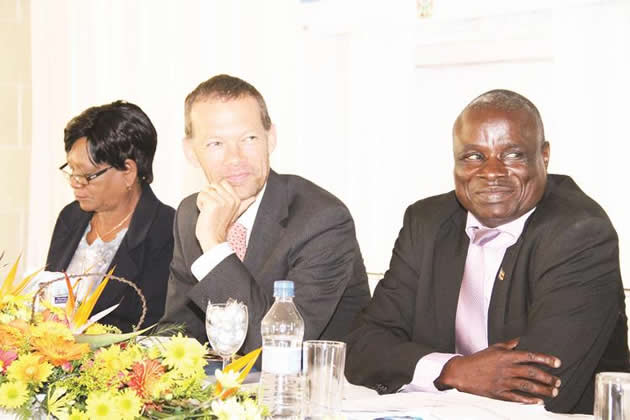Projects divorced from intended beneficiaries


CDE JOSEPH GONDO(RIGHT) MR ERIK RASMUSSEN AND MRS EVELYN NDLOVU AT THE LAUNCH OF RURAL AGRICULTURE REVITALISATION PROJECT IN HARARE YESTERDAY
Ruth Butaumocho Gender Forum
Last week, the Government with the assistance of DANIDA and SNV of Netherlands, launched a US$6 million agricultural project expected to benefit 280 000 commercially-oriented small holder farmers across Zimbabwe.
The red carpet evening was marked by pomp and fanfare as speaker after speaker applauded the initiative, which is expected to alleviate suffering and improve the lives of thousands of people.
One would have expected the main beneficiaries — the small scale farmers to be there in their numbers — but alas, they were not even represented.
A cursory glance at the programme of the events showed that the farmers were not part of the line of speakers, nor were they part of the crowd that had gathered to witness this momentous occasion.
Save for one or two words of gratitude in a well manicured speech from the ZFU — probably to suit the grandeur associated with the occasion —the farmers had been left out again.
Their aspirations, dreams and vision towards this programme will remain unknown.
A week after the launch, it will not be surprising that the majority of these farmers still don’t have the faintest clue how the initiative will better their lives and how they will benefit from the benevolence of the donor community in partnership with the Government.
The ink has since dried up following the signing ceremony but I can assure you that the said beneficiaries in the heart of Dotito, Tyunga, Semuchembo and Omay will only get to know of the project some weeks or months from now.
Over the years, there has been growing concern on how developmental projects have become elitist in nature and appear to be far divorced from the needs and aspirations of their intended beneficiaries.
One line of criticism which has become quite strong in the recent development programmes is that implementers are now using a top-down approach instead of the bottom up initiative. Rather than establishing exactly what people want, they are now bringing aboard own ideas, own initiatives, a situation that does not augur well for communities.
Without their participation, the people will benefit but they will not develop from that project. It will remain as “their” project, and far divorced from the community, which will rightly claim that it was never consulted.
I am sadly reminded of a case a few years ago where field officers from an international organisation visited one of the communities to assess women’s needs so that they would assist them.
When they got to the villages they were shocked that almost every woman they came across was not wearing a bra. Touched by such a plight and a yearning need to assist, the field officers went back to their offices and frantically looked for well wishers to assist them to buy the badly needed under-garment.
A few weeks later, the community was pleasantly surprised to see the field officers back-with truckloads of goodies-neatly stashed in the V8 Land Cruisers popular with the donor agencies.
The smiles on the women’s faces quickly disappeared on realising that the “goodies” were nothing more than bras-in all forms, shapes, colours, sizes, including the famous brand-Wonderbra.
The donor agency had brought the villagers a tonnage of bras.
“Oh my God, bras!” one woman gasped in awe.
Rather than use them for their intended purpose, some of the women used the bras for bundling firewood, while the more enterprising ones exchanged them for food with female teachers at a neighbouring school. Surely the women did not understand how an organisation could give them bras, when they badly need food, water and money to kick start vegetable gardens and other meaningful initiatives.
There is no doubt that the donor agency had carried out a baseline assessment, which brought on the fore, issues that needed to be urgently addressed. Although there could have been other pressing needs than the under-garments (which turned out not to be important to these women)-the field officers naturally felt they needed to care for a well-clothed beneficiary, hence the decision to bring bras first, and look at other needs later.
Despite their limitations, lack of education and limited understanding on certain issues, aid recipients can do benefit a lot more if they are informed and consulted before a project of whatever magnitude is implemented. Some of these benefits include development of important personal and social skills and a greater sense of ownership and pride in project outcomes.
While it may be true to a certain extent that aid recipients need financial and material assistance to enable them to move to another level in their lives, it however, does not mean that they are ignorant of their own needs and how they want challenges besetting them to be addressed.
Beneficiaries know where it hurts most, and they are in a better position to define their own situation, with the assistance of donor agencies, the Government and other people willing to help.
What may appear as a pressing need to a beneficiary may actually be the last thing on their mind.









Comments